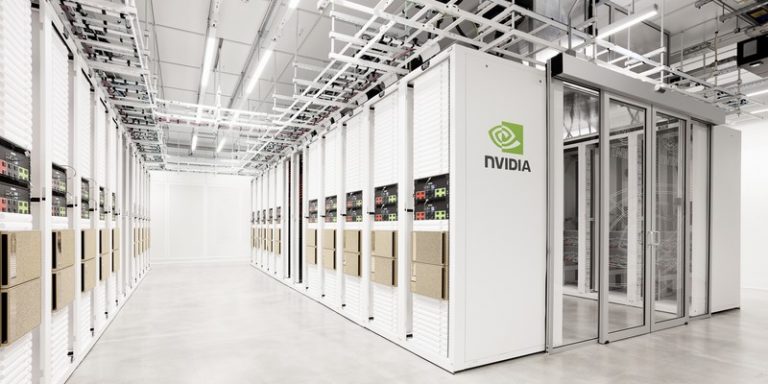
On July 7, Nvidia opened the Cambridge-1 supercomputer dedicated to AI and health research in the UK. It is located in Harlow, England, more precisely on the site of Kao Data. Several projects were announced on the occasion of its inauguration and concern several themes: genomic analysis, research into new drugs, processing and synthesis of medical images.
A new supercomputer with a computing capacity of 400 petaflops
This new Cambridge-1 supercomputer, one of the most powerful in the UK, offers a computing capacity of 400 petaflops, or1015 floating point operations per second, dedicated to AI and 8 petaflops dedicated to solving linear equations. According to Nvidia, this supercomputer is the 42nd most powerful structure in the world and thus dethrones the one of the meteorological office of the United Kingdom, ranked 58th.
The NVIDIA Clara frameworks have been optimised to leverage the power of the system for large-scale research. Jensen Huang. Jensen Huang, founder and CEO of NVIDIA, said of the power of the Cambridge-1 supercomputer:
“Cambridge-1 will give leading researchers from business and academia the ability to do all their work on the UK’s most powerful supercomputer, unlocking clues about diseases and treatments at a scale and speed previously impossible in the UK.”
The supercomputer will be dedicated to health and medicine, with David Hogan, enterprise vice president at Nvidia, saying:
“The aim is to transform the medical sector by enabling advances that would be impossible with traditional infrastructure, particularly in the face of the mass of health data that has accumulated exponentially in recent years.”
Of course, thanks to COVID-19, the arrival of tools like Cambridge-1 is a real boon to the sector, with Craig Rhodes, Nvidia’s head of artificial intelligence for health and biology in the Europe, Middle East and Africa industry, stating:
“COVID-19 made it even more obvious that it was time for AI and supercomputing to help medical research. Today, faced with the arrival of variants, supercomputing could allow vaccines to be adapted quickly, for example.”
Several projects already announced around imaging, genomics and drug production
Cambridge-1 is a supercomputer designed and built specifically for external research. Several private and public partners have announced projects related to this new tool. Here is the complete list:
- AstraZeneca aims to transform drug discovery with AI: Nvidia and AstraZeneca will work together to accelerate drug discovery, creating a transformer-based generative AI model for chemical structures. They are planning a separate project focused on using AI in digital pathology, which should use the power of Cambridge-1. Lindsay Edwards, vice president and head of AI, respiratory and immunology, R&D BioPharmaceuticals at AstraZeneca, says:
“Training AI algorithms on whole slide images is challenging in part because of the size of the images. Working with NVIDIA on Cambridge-1 allows us to extend our current work and develop new methodologies advancing the use of AI in digital pathology.”
- GSK wants to focus its research on new drugs: GSK’s R&D approach focuses on genetically validated targets, which are twice as likely to become drugs and now account for more than 70% of its research effort. The firm aims to be at the intersection of human genetics, functional genomics, AI and machine learning. Dr Kim Branson, senior vice president and global head of AI-ML, adds:
“Advanced technologies are at the heart of GSK’s R&D approach and help unlock the potential of large and complex data through predictive modeling at new levels of speed and accuracy. We are delighted to have the opportunity to partner with NVIDIA to deliver on GSK’s drug discovery ambition and contribute to the UK’s rich life sciences ecosystem.”
- King’s College London and Guy’s & St Thomas NHS Foundation Trust will work around AI-generated synthetic brain data: both institutions will leverage Cambridge-1 to train AI models with tens of thousands of MRI scans so they can generate synthetic brain images. Professor Ian Abbs, chief executive. of Guy’s and St Thomas’ NHS Foundation Trust, states:
“The power of artificial intelligence in healthcare will help speed up patient diagnosis, improve services such as breast cancer screening and support the way we assess risk and prioritise patients based on clinical need.”
- Oxford Nanopore will work on real-time evolutionary genomics: Oxford Nanopore’s sequencing technology is already used by around 100 countries worldwide in the field of genomics. The organisation will use NVIDIA tools – specifically Cambridge-1 – to develop AI systems that will aim to improve the speed and accuracy of genomic analysis. Rosemary Sinclair Dokos, vice president of product and program management at Oxford Nanopore, said:
“Harnessing the power of Cambridge-1 will help us further accelerate the development of our algorithm to support powerful and accurate genomic analysis. It will also allow scientists using our technology in the field to gain more insights across a wide range of research areas.”
Translated from Cambridge-1, le nouveau supercalculateur conçu par Nvidia dédié à l’intelligence et à la santé









